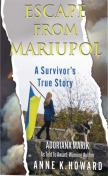
LitPick Review
Adoriana Marik is a tattoo artist and merchandiser who lived in Mariupol during the Russian-Ukrainian War. She described her background and some history about Ukraine’s relationship with Russia before the current war seen through her perspective. Before the war began, there was tension in the air because of Putin’s threats of Ukraine. Marik put her documents in order and prepared for a hasty escape from Ukraine for herself and her dog, Yola. On February 23, 2022, Marik woke up to the sounds of explosions and the beginning of Russia’s invasion of Ukraine. Most of the book focuses on Marik’s attempts to seek shelter, protect herself and Yola, and survive in a war-torn country before she emigrated to the Czech Republic and eventually the United States.
Opinion:
Marik’s story is a detailed, moving, suspenseful, and graphic account of the reality of living in a country torn apart by invasion and war. Some of most poignant moments are when she compared her surroundings before, during, and after the invasion. In one chapter, she wrote about a cafe that she frequented with her friends. Then she mentioned seeing the remains of the cafe destroyed in an explosion on the news. The pages in which she described walking zombie-like and numb through a devastated almost apocalyptic city is a true moment of heartbreak. These moments evocatively captured the angst of the average citizen when they are caught unaware in a situation that shatters the world around them. There are also passages where Marik conveyed the desperation and sacrifice of surviving in a violent world and the resilience to help others in the same situation. In one chapter, Marik used her bootlace as a tourniquet to heal a man's wound and pulled glass out of other injured people. In another, a woman whom Marik called “the Florence Nightingale of Ukraine” sheltered her and fed her soup. Marik took her dog, Yola, to every location and made sure wherever she went, her fur baby came with her. Marik kept hold of her pet out of unconditional love and to care for someone during those dark days. Marik even cited Yola as a motivation for her to stay alive and keep going during the war.
Marik's survival instincts continued as she sought refuge in the Czech Republic and United States. She was surrounded by people who either helped or complained about the recent immigrants from the war. She moved from place to place taking pleasure in the few little things that she could: a drink of fresh water, some biscuits, a friendly face, a warm bed, and of course, Yola’s loyal presence. Marik’s love and loyalty for Ukraine is prominent throughout the book, even more so because she is away from it and has seen it at its worst: a country rich in beauty, culture, and history, brutally stripped, destroyed, and made ugly by the avarice and tyranny of a leader from the larger country next to it. She acknowledged many of the difficulties that Ukraine had after the end of the Cold War to maintain a free, democratic, and independent nation and the oligarchs’ control over it. She recognized the strength and determination of Ukraine's people to make that independent process happen. This is a nation whose people didn't take these attacks, nor Putin's desire to dominate them, lying down. They fought and defended themselves against the larger oppressive military. Even though Marik’s objective throughout the book was primarily to survive and protect those closest to her, she had a deep admiration for those who fought, choosing defense, even at the point of death, over domination. She also thanked the Russians who spoke out against Putin's tyranny often resulting in their own arrest or death, knowing that Putin is not an example of every Russian. Marik defended Ukraine from the propaganda that Putin’s government spread across the media. Through her words, she challenged the ugly stereotypes that many around the world held of Ukraine being full of Nazis. (The few Nazis that existed and committed crimes motivated by their hatred were routinely arrested and tried by Ukrainian law, not Russian interference.) When some friends wanted to accept emigration into Russia, Marik refused, believing that her friends were fooling themselves if they thought that upon arriving in Russia they would be treated as anything better than second class citizens. She argued with a conspiracy theorist in one chapter by asking him how he would feel if it happened to him.
Escape from Mariupol reveals Adoriana Marik as a complex woman of great strength, spirit, and courage to survive, who leaves a world torn apart by war and then recounts her experience in her own words.


